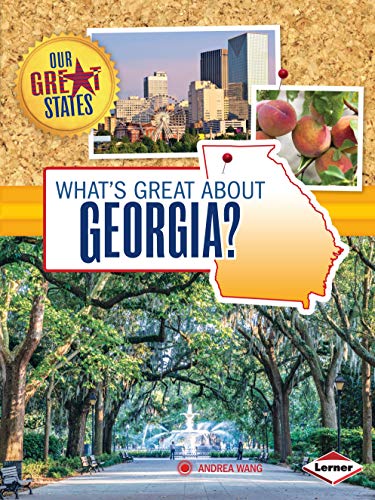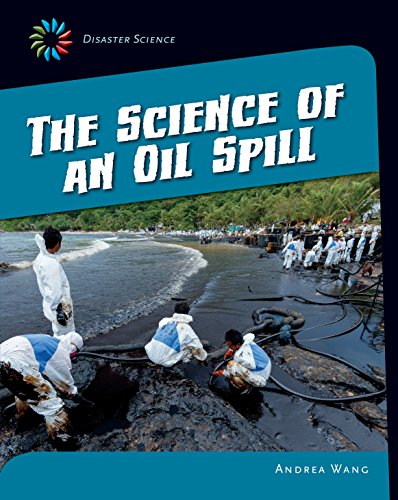-
What's Great about Georgia?
Andrea Wang
eBook (Lerner Publications TM, Aug. 1, 2014)What's so great about Georgia? Find out the top ten sites to see or things to do in the Peach State! Explore Georgia's stunning scenery, buzzing cities, and exciting history. The Georgia by Map feature shows where you'll find all the places covered in the book. A special section provides quick state facts such as the state motto, capital, population, animals, foods, and more. Take a fun-filled tour of all there is to discover in Georgia! Q
Q
-
What's Great about Georgia?
Andrea Wang
Paperback (LernerClassroom, Aug. 1, 2014)What's so great about Georgia? Find out the top ten sites to see or things to do in the Peach State! Explore Georgia's stunning scenery, buzzing cities, and exciting history. The Georgia by Map feature shows where you'll find all the places covered in the book. A special section provides quick state facts such as the state motto, capital, population, animals, foods, and more. Take a fun-filled tour of all there is to discover in Georgia! Q
Q
-
What's Great about Maine?
Andrea Wang
language (Lerner Publications TM, Jan. 1, 2015)What's so great about Maine? Readers will build skills to identify and summarize the top ten sites to see or things to do in the Pine Tree State. We'll explore Maine's outdoor adventures, historic parks, fun-filled museums, and fascinating history. The Maine by Map feature helps students locate all the places covered in the book. A special section provides key state details such as the state motto, capital, population, animals, foods, and more. Take a fun-filled tour of all there is to discover in Maine. Q
Q
-
What's Great about Maine?
Andrea Wang
Paperback (LernerClassroom, Jan. 1, 2015)What's so great about Maine? Readers will build skills to identify and summarize the top ten sites to see or things to do in the Pine Tree State. We'll explore Maine's outdoor adventures, historic parks, fun-filled museums, and fascinating history. The Maine by Map feature helps students locate all the places covered in the book. A special section provides key state details such as the state motto, capital, population, animals, foods, and more. Take a fun-filled tour of all there is to discover in Maine. Q
Q
-
Learning about Asia
Andrea Wang
Paperback (LernerClassroom, Aug. 1, 2015)Asia is the world's largest continent, both in land area and in population. But did you know that in India alone, people speak more than 1,000 languages? Or that not everyone agrees about which countries should be considered part of Asia? Learn more about the diverse continent of Asia, from its people and countries to its landforms, economy, and more. Q
Q
-
What's Great about Maine?
Andrea Wang
Library Binding (Lerner Publications TM, Jan. 1, 2015)What's so great about Maine? Readers will build skills to identify and summarize the top ten sites to see or things to do in the Pine Tree State. We'll explore Maine's outdoor adventures, historic parks, fun-filled museums, and fascinating history. The Maine by Map feature helps students locate all the places covered in the book. A special section provides key state details such as the state motto, capital, population, animals, foods, and more. Take a fun-filled tour of all there is to discover in Maine. Q
Q
-
Malala Yousafzai: Nobel Peace Prize Winner and Education Activist
Andrea Wang
Library Binding (Core Library, Jan. 1, 2015)Details the life and work of the education activist, covering her childhood, shooting at the hands of the Taliban, and life in England today. U
U
-
The Science of an Oil Spill
Andrea Wang
eBook (Cherry Lake Publishing, Dec. 1, 2014)This book discusses the science behind oil spills and their effects. The chapters examine history's worst oil spills, explain how oil spills happen, and show how scientists are developing safer ways to collect and transport oil. Diagrams, charts, and photos provide opportunities to evaluate and understand the scientific concepts involved.
-
Learning about Asia
Andrea Wang
Library Binding (Lerner Publications TM, Aug. 1, 2015)Asia is the world's largest continent, both in land area and in population. But did you know that in India alone, people speak more than 1,000 languages? Or that not everyone agrees about which countries should be considered part of Asia? Learn more about the diverse continent of Asia, from its people and countries to its landforms, economy, and more. Q
Q
-
How Can We Reduce Fossil Fuel Pollution?
Andrea Wang
Paperback (LernerClassroom, Jan. 1, 2016)Fossil fuels such as coal, oil, and gas create many types of pollution. But did you know that scientists have found ways to limit the pollution's effects? Or that even small changes can greatly reduce the pollution you create? Find out more about how we can reduce fossil fuel pollution. As part of the Searchlight Books™ collection, this series sheds light on an important question―What Can We Do about Pollution? Informative text, compelling photos, and engaging captions will help you find the answer! R
R
-
What's Great about Georgia?
Andrea Wang
Library Binding (Lerner Publications TM, Aug. 1, 2014)What's so great about Georgia? Find out the top ten sites to see or things to do in the Peach State! Explore Georgia's stunning scenery, buzzing cities, and exciting history. The Georgia by Map feature shows where you'll find all the places covered in the book. A special section provides quick state facts such as the state motto, capital, population, animals, foods, and more. Take a fun-filled tour of all there is to discover in Georgia! Q
Q
-
The Science of an Oil Spill
Andrea Wang
Paperback (Cherry Lake Pub, Aug. 1, 2014)This book discusses the science behind oil spills and their effects. The chapters examine history's worst oil spills, explain how oil spills happen, and show how scientists are developing safer ways to collect and transport oil. Diagrams, charts, and photos provide opportunities to evaluate and understand the scientific concepts involved. T
T